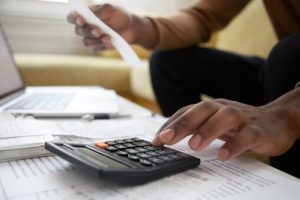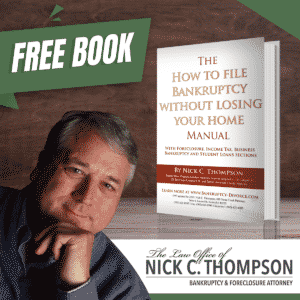Everyone has a problem sooner or later. The problem is you never know when it will come along. So, if you use a credit card or purchase an auto just before filing, you are probably an honest but unfortunate debtor who didn’t know that bankruptcy was around the corner. People also often charge items on their credit cards or find themselves needing a car just before a family death, divorce, or disability forces them to file bankruptcy. They might also need and purchase washers, tires, and clothing just before they file. But what about running up a credit card just before filing bankruptcy?
Run up Credit Cards and Later Filing for Bankruptcy
Bankruptcy judges make rulings in cases involving billions of dollars. A judge rarely considers it fraud if a consumer buys a $1,000 tent for a refrigerator a month before filing bankruptcy. Bankruptcy judges hear cases involving corporate officers who defraud and steal from investors, creditors, and stockholders.
If you Run up credit cards for necessities it is rarely a problem
However, the mother who buys a car, lawn mower, or refrigerator just before filing Chapter 7 is rarely found guilty of fraud. Most consumers are just unlucky debtors who find themselves suddenly filing bankruptcy after a disability, death, or other emergency strikes. Bankruptcy for consumers means the family needs to recover. Credit card companies understand, and they offer debtors credit cards within days after they file.

The problem is if you max out credit cards just before filing bankruptcy, it looks like it’s part of your planning for bankruptcy. If you purchase necessities like back-to-school items in August, the creditor has a problem proving fraud. But, if the creditor files an adversary case, your attorney often sues the creditor back. The attorney often recovers after you file the response for bankruptcy lawyer fees, other law firm charges, and damages for him filing such a lawsuit under 11 USC § 523 (d). Filing an adversary lawsuit against a debtor for credit card charges and not being able to prove fraud allows damages when a creditor’s action is not “substantially” justifiable.
Guidelines for Proving Non-Dischargeability When Run Up Credit Cards Before Bankruptcy
To prove fraud, the non-dischargeability must file within 60 days after the 341 meeting takes place or 90 days after the bankruptcy case files. Any objection is due by these dates. Whether the person is a creditor or trustee, they must file the objection to discharge within these periods.
Plus, the burden of proof is generally on the creditor, not the debtor. Taking out cash advances or purchasing unnecessary luxury items like Rolex watches days before you file for bankruptcy will be ruled as fraud. However, if the creditor wins all that he wins is a judgment for the amount of the Rolex watch. You still don’t have to repay the rest of the credit card. Remember, it is always hard for a bankruptcy judge to pity a person who owns a Rolex watch or more than the judge owns.
The maxing out credit cards statute
The statute says charging cash advance over $650 in “luxury goods or services” from a creditor up to 90 days before filing is presumed to be non-dischargeable. Cash advances over $925 up to 70 days before filing are also presumed non-dischargeable. However, only that charge is non-dischargeable, the rest of the account is dischargeable. The test for fraud looks at least 18 other factors that may prove it was not fraudulent.
To get around this presumption of fraud just wait for a short period (over 90 day) to eliminate the presumptions. By waiting out these periods, the burden of proof shifts and it becomes heavily on the creditor.
The amount you charge, the type of goods you buy, and the timing are the only three of 20 factors that a judge considers and plays a vital role in getting debt relief. Suddenly becoming unexpectedly disabled after you made the charges means when you filed for bankruptcy, it was not foreseeable, and there is no fraud.
Even if the person is a little unrealistic, the client’s state of mind determines if it is fraudulent. Therefore, if the debtor’s belief is reasonable that the debtor was going to repay, then, if something happens later, it’s easy to prove the charges were not fraudulent.
 Filing Chapter 7 Bankruptcy Immediately after Using your Credit Card
Filing Chapter 7 Bankruptcy Immediately after Using your Credit Card
Chapter 7 Trustees most often concern themselves with 18 USC §152, the Concealing of assets. A Chapter 7 bankruptcy Trustee wants to find and sell non-exempt assets. He gets up to 25% if the asset is not listed in the petition. If it is not listed it cannot be exempted; and he can then sell it.
But if there is a scheme to defraud, a creditor or trustee may refer to 18 USC§157 to deny you from discharging debt. Fraud in the bankruptcy sense is rarely criminal. Fraud often becomes an issue just because of timing, an error in transferring assets, or not listing an asset.
In 30 years of practice and thousands of cases, none of my clients received a criminal charge. Even when a client admits he intentionally planned to charge prior to filing, the worst sanction was that the amount charged or the case could not be discharged. In other words, the worst sanction is whatever you charged is non-dischargeable, or the case would not be discharged.
Example of Fraud with Credit Card Purchases before Filing for Bankruptcy
From 2010 to 2018, I filed over 100 cases a year and did not have one creditor file an adversary proceeding to recover money from a client who charged sometimes thousands of dollars on a credit card before filing. In 2010, I had a client who purchased 24 Rolex watches before filing charging 12 of the watches on Discover and the other 12 on an American Express card.
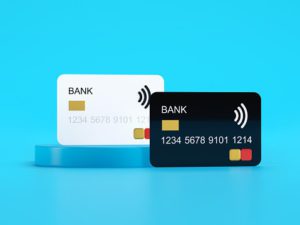
When an adversary petition like this is filed and a discharge is denied, the creditor typically only wants his debt to be held non-dischargeable. The bankruptcy judge only makes a limited ruling that part of the debt which is fraudulent is non-dischargeable.
The creditor still has to collect. It’s very hard to collect from a debtor who has just filed for bankruptcy and has no assets to pay the credit card debt. This is why a creditor filing a lawsuit of non-dischargeability is rare. The credit card company has to pay attorney fees and court costs to get a judgment against someone who is uncollectible.
Guidelines for Credit Card Use after Your Filing for Bankruptcy
After you file bankruptcy, do not continue to use your credit card and charge on that credit card. There is no sanction for obtaining and using a new credit card after filing. Your filing is your testimony that you can no longer afford your old credit card bills. A bankruptcy filing eliminates the old debt which is prior to filing, it does not generally affect any new debt in a Chapter 7. In a Chapter 13, you have to have permission to incur any new debt. Any new charges will not discharge because only pre-petition debt is discharged when you file bankruptcy.
After filing, you’ll find your mailbox stuffed with offers for new credit cards and autos. Of course, most offers will be for higher interest rate autos and credit cards. I suggest that if you retain and reaffirm an auto and repay over six months, your FICO score will increase to a point where you can easily get an auto or credit card at a reasonable interest rate. We have an article on how to recover with a 720 credit score on your own. Most of your debt will be reported as account closed after your discharge. It will not be reported as being delinquent
 The Schemes that Lead to Business Bankruptcy Fraud
The Schemes that Lead to Business Bankruptcy Fraud
Commonly, a person goes into business but doesn’t know how to keep records. In the case of a business debtor who fails to keep records and can’t account for funds, the worst-case scenario is that they are denied the ability to receive a discharge. It is impossible to list all the different schemes a business insider can use to charge up business debts and then attempt to bankrupt the debts. But, proving business fraud in bankruptcy filing is hard. After the assets are gone, it might be impossible to recover those assets. Interestingly, consumers are amateurs compared to the ability of executives to raid their own business or bank assets and commit fraud.
Common Schemes in Business Bankruptcy Fraud are as Follows:
1. Bust-Outs
Bust-outs are when the business obtains credit and increases corporate debt just before filing by ballooning the company’s credit cards. Often the business makes small and increasing charges and then suddenly heavily charges just before filing. Consumers debtors also have bust-outs. But bust-outs are only fraudulent if they are planned to increase the debt.
2. Fraudulent Financial Bookkeeping
Fraudulent financial bookkeeping happens when the debtor overestimates total monthly income and assets or underestimates expenses or debt. It often happens in applying for credit. These fraudulent credit applications and financial statements become a problem.
3. Bleed-Outs
Bleed-outs are when the debtor charges expenses and transfers assets to insiders making the company worthless. These insiders make sure the business fails so they can take its assets. The theft may also be taking the corporate opportunities or use of assets.Bleeding off assets uses transfers where valuable assets are traded for assets of lesser value. These uneven exchanges shift assets and profits to a new company person. It leaves behind debts and worthless assets for a credit card company or trustee.
4. Looting
Looting occurs when corporate officers and debtors convert and take assets. The corporate officers often pretend these are arm’s length transactions when they sell assets to themselves or another party. These parties often connect in some way to the officers who are selling or converting assets.
Hire the Experienced Bankruptcy Attorney to Know Your Options After Maxing Up Your Credit Cards!
These are just some of the issues you must know and consider if you are wanting to file bankruptcy. Hopefully, you are not running up your credit cards but if you do it often is not a problem. Companies rarely file an adversary proceeding in objection. Hiring a professional and experienced bankruptcy attorney and giving him all the sensitive or confidential information will help you plan your case better.
Nick Thomson personally takes care of all clients and ensures they get the maximum benefit from his expertise. Call Nick’s law firm now to get instant help from building a trusted attorney-client relationship and get guidance. Remember maxing out credit cards is not usually fatal to your bankruptcy case.
Resources for Bankruptcy
Louisville, Kentucky Bankruptcy Forms
 Other Related Information
Other Related Information
Chapter 11 Business Bankruptcy Information
How to Discharge Student Loans in Bankruptcy
Fraudulent Concealment and Transfers in Bankruptcy
Bankrupt or Discharge Student Loans
If you are considering bankruptcy, don’t delay because timing is crucial. I am here to help you. So, contact my office immediately to start the conversation—Nick C. Thompson, Bankruptcy Lawyer: 502-625-0905.
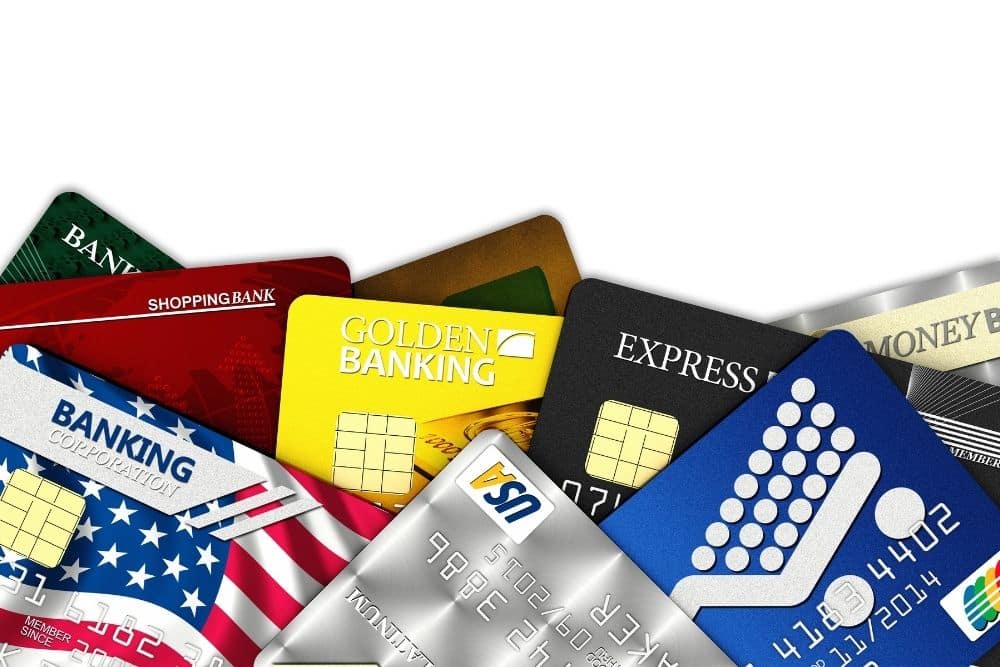
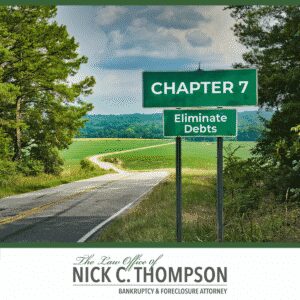 Filing Chapter 7 Bankruptcy Immediately after Using your Credit Card
Filing Chapter 7 Bankruptcy Immediately after Using your Credit Card